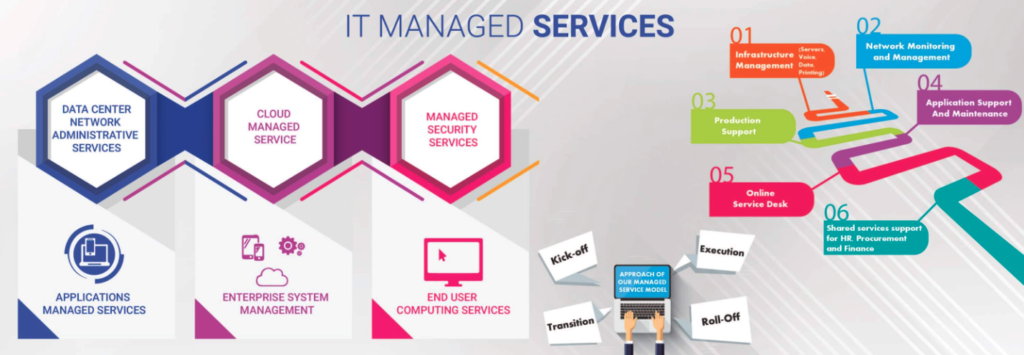
IT Managed Services (Image by Paraminfo)

IT Managed Services (Image by Paraminfo)
IT Management Service Provider (MSPs) are third-party companies that take charge of a client’s IT infrastructure and provide a comprehensive, proactive, and strategic approach to managing and supporting IT systems.
This third-party vendor enables your businesses to focus on their core competencies, leaving the complexities of IT management in the hands of experts.
MSPs typically operate on a subscription service model, often billing customers monthly based on defined rates per computer or equipment.
Maintenance, security, monitoring, reporting, and other services are detailed in a Service Level Agreement (SLA) that outlines what the organization can expect from the MSP, including response times, performance, and security specifications.
MSPs use specialized tools or software platforms, such as Remote Monitoring and Management (RMM) tools and Professional Services Automation (PSA) applications, to manage IT systems and client projectsefficiently.
Some of the benefits of outsourcing IT services to MSPs include:
MSPs are multi-talented operators who work behind the scenes to ensure your company’s IT is running and soaring.
The IT MSPs services collectively enable businesses to focus on core activities while MSPs handle the complexities of IT management.
First, they jump in with managed computing services. It’s like giving your business’s IT a turbo boost, whether you’re cloud-based, on-site, or somewhere in between. Then, there’s the network management, akin to a guardian angel, ensuring everything’s connected, secure, and running like a well-oiled machine.
They’re always on guard, protecting your digital assets from threats and ensuring your business stays safe and sound.
And, for the cherry on top, they’re database whizzes, too, keeping your precious data safe no matter where it lives.
Cloud services? Check. MSPs guide your business through the cloud like expert pilots, making sure you get the full benefits without any turbulence. And if something goes awry, their helpdesk support is there in a snap, 24/7, to fix issues before they become real headaches.
Lastly, MSPs are the sage advisors of the IT world. They don’t just fix problems; they strategize, offering wisdom and insights to align your IT with your big-picture goals.
These key services offered by MSPs, including IT service management, play a crucial role in maintaining the resilience and efficiency of modern businesses in an increasingly digital landscape.
These customized solutions enable MSPs to address different industries’ unique challenges and requirements.
For instance, in healthcare, MSPs provide specialized services such as managing electronic health records (EHRs), ensuring compliance with healthcare regulations, and offering robust cybersecurity measures to safeguard patient data.
These tailored services enhance patient care, improve efficiency, and ensure compliance with regulations like HIPAA in the United States.
In the context of businesses adopting remote and hybrid work models, MSPs have evolved to offer virtual application and desktop (VDI) solutions.
These solutions enhance the flexibility and scalability of a client’s IT infrastructure, enabling businesses to adapt effortlessly to changing business needs.
This adaptability aligns with the agility that MSPs are designed to provide, demonstrating their commitment to meeting all their client’s IT needs in a unified, centralized manner.
Moreover, MSPs are vital in facilitating seamless business operations by offering a comprehensive suite of IT services.
They function as a full-fledged IT department, handling everything from infrastructure and data management to cybersecurity, technical support, and strategic IT consulting.
These services are customized to meet the unique needs of a business, providing scalability and flexibility as the company expands or its needs evolve.
IT MsP providers bring their expertise to manage and optimize various IT infrastructure components, including hardware, software, and network systems, ensuring seamless operations.
MSPs are adept at designing, implementing, and maintaining robust network architectures. They configure networks for optimal performance and security and proactively address potential issues to ensure reliable, high-performing IT systems.
MSPs also take responsibility for server management, including setup, configuration, maintenance, and monitoring, ensuring servers run optimally and securely.
Furthermore, MSPs handle the complexities of cloud computing, assisting in selecting and implementing appropriate cloud solutions and ensuring scalability, security, and availability of cloud infrastructure.
MSPs implement comprehensive security measures such as firewalls, intrusion detection systems, and proactive threat monitoring to safeguard against cyber threats and data breaches.
MSPs also develop and assist in implementing disaster recovery and business continuity plans.
Their proactive approach to security and risk mitigation includes continuously monitoring systems and network performance, identifying vulnerabilities, and ensuring compliance with various regulatory requirements.
By managing security effectively, MSPs enable businesses to operate with peace of mind, focusing on their core operations without the constant worry of security threats.
RMM enables MSPs to proactively monitor and manage IT infrastructure, identifying potential issues before they escalate into critical problems.
These tools enable MSPs to monitor and maintain systems, networks, and security vulnerabilities. RMM facilitates quick issue resolution and preventive maintenance, minimizing downtime and enhancing system reliability.
By utilizing RMM, MSPs provide businesses with continuous oversight of their IT environment, ensuring that their systems are running at peak efficiency and addressing any issues swiftly, often before they impact business operations.

Managed Service Providers (MSPs) play a vital role in aiding businesses transition to cloud services, a key aspect of digital transformation.
MSPs provide expertise in cloud migrations, helping businesses leverage cloud technologies for enhanced scalability, efficiency, and innovation.
They guide organizations through this complex process, addressing legacy system incompatibilities and ensuring compliance with security standards.
MSPs help businesses capitalize on cloud benefits like cost savings, flexibility, and access to advanced capabilities, ensuring a smooth, secure transition with minimal disruption.
Round-the-clock support helps businesses overcome IT challenges promptly, minimizing the impact of issues like network outages or system failures.
This service is particularly vital for global businesses operating across different time zones. 24/7 support ensures immediate response to critical issues, reducing downtime and maintaining high productivity.
It also plays a significant role in customer satisfaction, as businesses can provide timely assistance regardless of the hour, building trust and loyalty.
MSPs are essential in developing and implementing disaster recovery plans for businesses, ensuring minimal disruption in case of IT emergencies.
They design strategies involving data backup solutions, redundant network paths, and failover systems. Regular testing and drills by MSPs ensure that these plans are effective and ready for immediate deployment when needed.
This proactive approach helps businesses maintain continuity and minimize operational disruptions and financial losses during unplanned events.
By partnering with MSPs, businesses can ensure a robust, reliable IT infrastructure capable of withstanding and quickly recovering from disasters.
Client testimonials and case studies are pivotal in evaluating Managed Service Providers (MSPs). They provide real-world success stories that offer insights into an MSP’s capabilities and reliability.
Testimonials from satisfied clients serve as powerful endorsements, highlighting the quality of service and support offered by the MSP.
They can demonstrate the MSP’s ability to resolve complex issues, improve efficiency, and contribute to the client’s business success.
Moreover, case studies offer a detailed view of how MSPs address specific challenges, implement solutions, and deliver measurable client benefits.
This tangible evidence of success can be more persuasive than marketing materials, as it represents the actual experiences of clients who have benefited from the MSP’s services.
Cost is a crucial factor when hiring an MSP. However, balancing budget constraints with the need for quality service is essential.
The cost of MSP services varies based on the range of services provided, the level of expertise, and the business’s specific needs.
While it might be tempting to opt for lower-cost options, this could lead to compromised service quality, negatively impacting a business in the long term.
Therefore, businesses need to consider an MSP’s immediate cost and value regarding reliability, expertise, and the potential to drive business growth.
Investing in a quality MSP can lead to greater efficiency, security, and scalability, ultimately providing a better return on investment.
Businesses should weigh the cost against the potential benefits and risks to make an informed decision that aligns with their IT needs and financial constraints.
As we’ve seen, we can highlight the essential role of MSP providers in enhancing and supporting your business IT infrastructures.
MSPs offer various services, including proactive IT management, cybersecurity, and cloud migration, which are crucial for maintaining operational efficiency and technological stability.
MSP providers offer customized solutions to meet the specific needs of various industries, ensuring smooth integration and adaptability to evolving business requirements.
And in this smooth integration and adaptability context, Octobits emerges as an innovative partner in IT service management.
With its consolidated dashboard for managing IT services, Octobits streamlines workflows and integrates seamlessly with major IT vendors.
As a one-for-all dashboard platform, Octobits enhances efficiency and decision-making for IT and business departments, making it an ideal choice for businesses looking to optimize their IT management.
As an option in IT management service provider, collaborating with